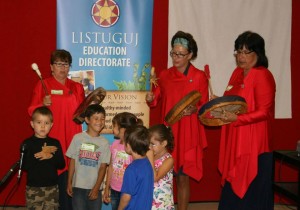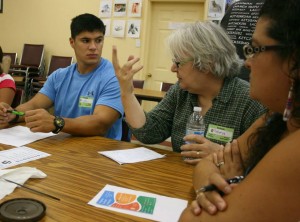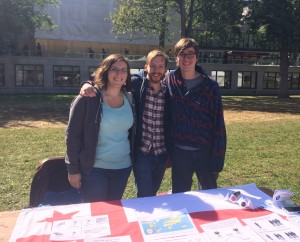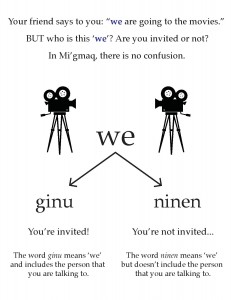Last Tuesday, close to ninety people gathered in the Listuguj Bingo Hall to hear guest speakers, explore various booths and discuss the Mi’gmaq language. Many people put in a lot of effort into making the language workshop what it was and it was a great success. When speaking to the crowd, both Starr Paul and Diane Mitchell were able to convey a great sense of urgency about the fate of the Mi’gmaq language while at the same time gently welcoming new speakers to try, fail and try again, knowing that a language is not saved in a day.

Miss Faye, Victoria Labillois and Sheila Swasson along with last year’s Mi’gmaq Immersion nursery kids. by Lola Vicaire
Similarly Conor Quinn, with an understanding of all the difficulty and embarrassment that can come with learning a new language (speaking several himself), offered from his booth tangible and specific advice on how to overcome these obstacles and embrace learning Mi’gmaq.

Diane Mitchell and Houston Barnaby hashing out some details. by Lola Vicaire
Yet, while all the organized booths and activities were wonderful to see, it seems to me that the greatest success of the day was the simple fact that so many people were able to come together to think about and discuss (and speak!) Mi’gmaq. In any case of language revitalization, the efforts of individuals can only do so much. The real burden of work is on community members, both for speakers to teach the language and nurture its use and for learners to set aside time and take on the truly enormous task that is learning a language. What I saw on Tuesday was people from both camps thinking hard about their roles, scrapping old, tired ideas and replacing them with new, inventive ones. Nothing was solved for certain, nor could it have been, but when individuals come together to let each other know that they care deeply about an issue, that is what makes a community and a community is what makes change.




